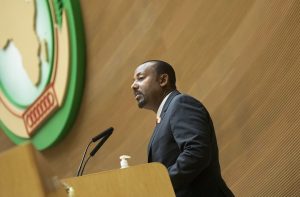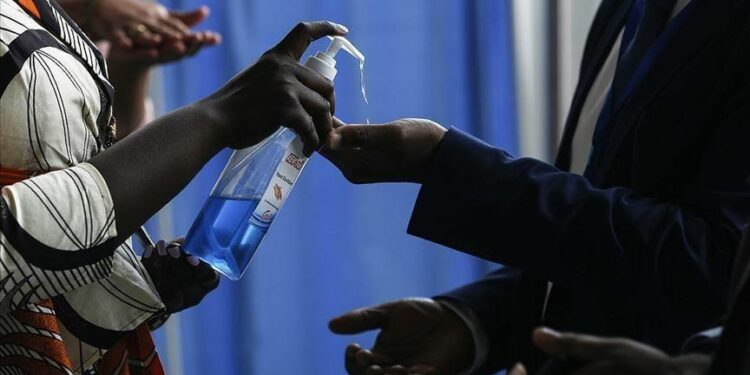At the opening ceremony of the 36th African Union Summit, The Prime Minister of Ethiopia, Dr . Abiy Ahmed, who also serves as the host leader, preaches a need to hold on to the dictum that says ‘African Solution to An African Problem’, thereby calling on his fellow continental leaders to always look within when there is a need that needs solution regarding issues that are affecting the nations and the continent as a body.
He said, “Ethiopia is where it is today in no small part because of the tireless efforts of the African Union and the wisdom of its deeply-held belief in the principle of “African solutions to African problems”.
One of the earliest and most powerful expressions of this principle comes from the opening statement delivered by His Imperial Majesty Haile Selassie in his address to the first Summit of the OAU in May 1963.
His Imperial Majesty acknowledged that future disputes among African countries were only natural. But he also advised that, when disputes arise, the effort to resolve them “must be confined to this continent and quarantined from the contamination of non-African interference.”
Today, each time we assert and reassert the principle of African Solutions to African Problems, we are only applying the timeless wisdom of our forefathers for the resolution of contemporary challenges.
At the heart of the principle of African Solutions to African Problems lies a belief in African solidarity, African agency and the equal dignity of all human beings.
Here in Ethiopia, we do not just insist on the principle of African solutions for the resolution of our problems; we also present ourselves at the forefront in helping ourselves and our fellow African countries to resolve challenges.”
The Prime minister also decried the lack of sufficient food for Africa to feed itself and therefore stressed the need for all hands to be on deck to salvage the dire situation. The war in Ukraine is now an eye-opener for the continent whereby the little European nation is largely responsible for the wheat and fertilizers used in Africa. He buttressed the need for Africa to look with and solve there are own problems.
“While the principle of African Solutions to African Problems is widely raised in the scope of the conflict, it is imperative that we begin to extend this principle to a wide range of peace and security issues. Continental food security and food sovereignty are such issues.
Our continent is not only well able to feed itself but can become a bread basket of the world. With 65% of the world’s remaining uncultivated arable land in our backyards, we need to critically assess why one-third of the hungry people in the world are in our continent.
In Ethiopia, we have been working diligently to enhance agricultural productivity for the past four years. We have commenced an initiative that encourages smallholder farmers to farm in clusters that enable them to benefit from irrigation and mechanization.
Our laser focus on wheat productivity is bearing fruit. And our ambition to begin exporting wheat this year has already materialized. A great achievement for Ethiopia. An even greater achievement for our continent.
Ethiopia is also undertaking a massive campaign to encourage both large- and small-scale poultry, dairy, and livestock farming, as well as urban agriculture, through a national initiative we call loosely translated as ‘bounty of the basket’.
These efforts are showing promising results.
Not only will Ethiopia feed itself; we are confident that we can strongly contribute to global food supplies through exports and otherwise.
The 2023 Dakar Declaration on Food Sovereignty and Resilience rightly acknowledged the continental awakening that ‘it is time for Africa to feed itself and fully unlock its agriculture potential to feed the world.’
I call upon our African Union and development partners to support in unleashing this potential”, he said.
.”
In view of the COVID-19 pandemic and the debt burden on African countries, Aby called on world leaders to have a global framework of debt restructuring that is conducive to accelerating sustainable, inclusive green growth in Africa.
“While Ethiopia’s economy has been challenged by the COVID-19 pandemic, a drought, an internal conflict, and the impacts of the Russia-Ukraine crisis, we have nevertheless remained resilient as a nation.
Our home-grown economic reform program has also helped us persevere. Through this reform program that has enabled the opening up of the economy to competition, some of the major service sectors that have been closed to foreign investment for several decades, such as telecoms and finance, are being progressively opened.
We know the COVID-19 pandemic and the current global commodity shortages hurt public finances everywhere. Forced to spend on tackling the pandemic while tax revenues collapsed, most of our countries piled up unsustainable debts.
Now that the pandemic is over, nearly all of us want to put our economies back on a growth trajectory. But this will not happen without sufficient restructuring to make our external debt sustainable.
I, therefore, want to reaffirm our collective call for a fast and predictable global framework of debt restructuring that is conducive to accelerating sustainable, inclusive green growth in Africa.”
The African Union Summit is to serve and mobilize solutions and solidarity to turn its vision into reality, with a view to creating interlinkage with member states, AU bodies, private sector actors, development partners, and other stakeholders.



